Module 1 Unit 2 It’s a long story课件(共36张PPT) 外研版英语九年级下册
文档属性
| 名称 | Module 1 Unit 2 It’s a long story课件(共36张PPT) 外研版英语九年级下册 |  | |
| 格式 | pptx | ||
| 文件大小 | 5.8MB | ||
| 资源类型 | 教案 | ||
| 版本资源 | 外研版 | ||
| 科目 | 英语 | ||
| 更新时间 | 2024-10-01 20:22:08 | ||
图片预览



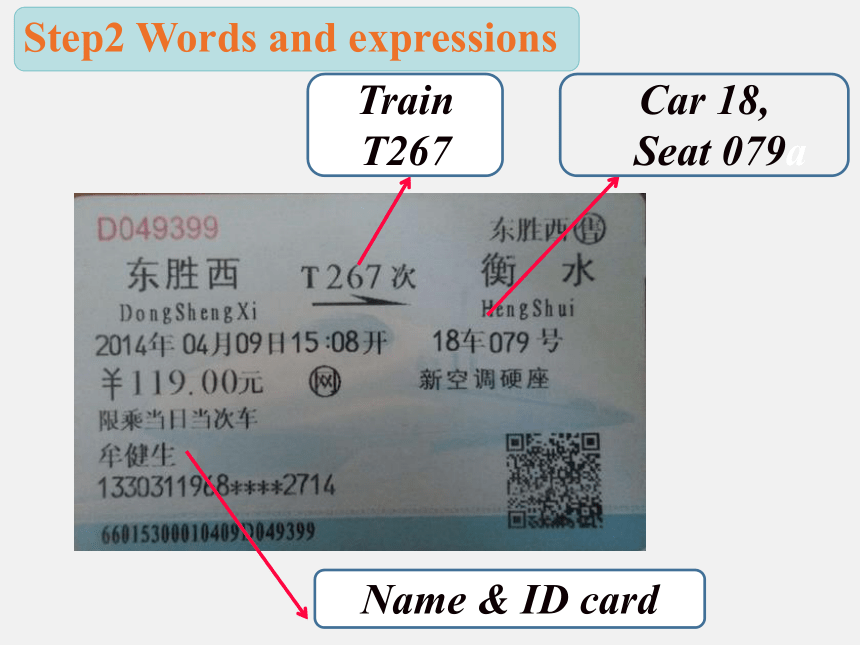
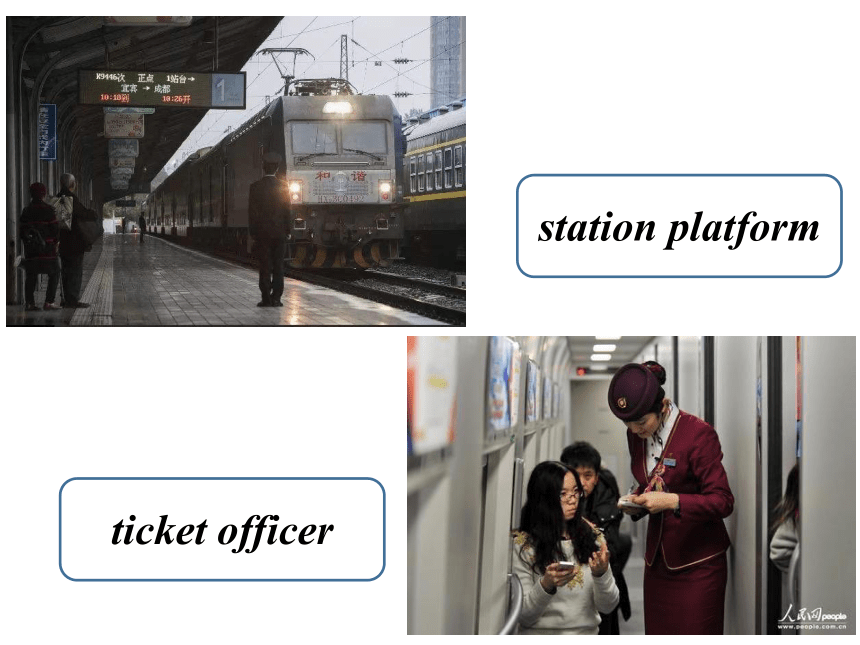
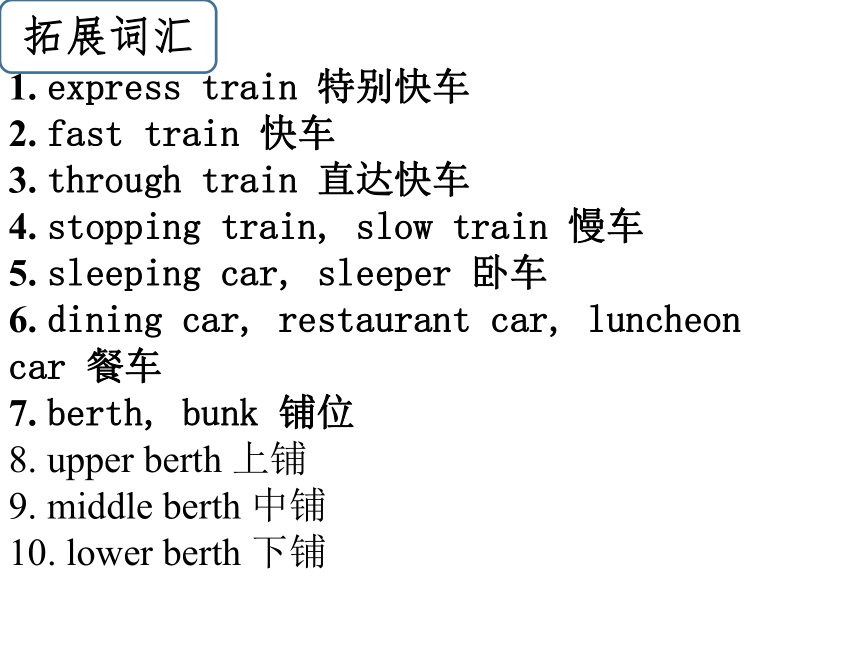
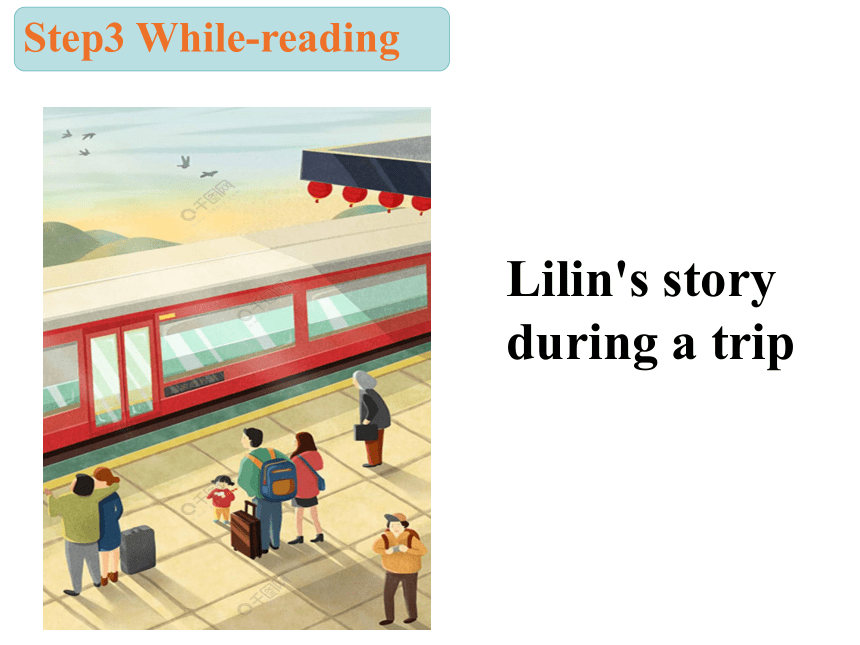
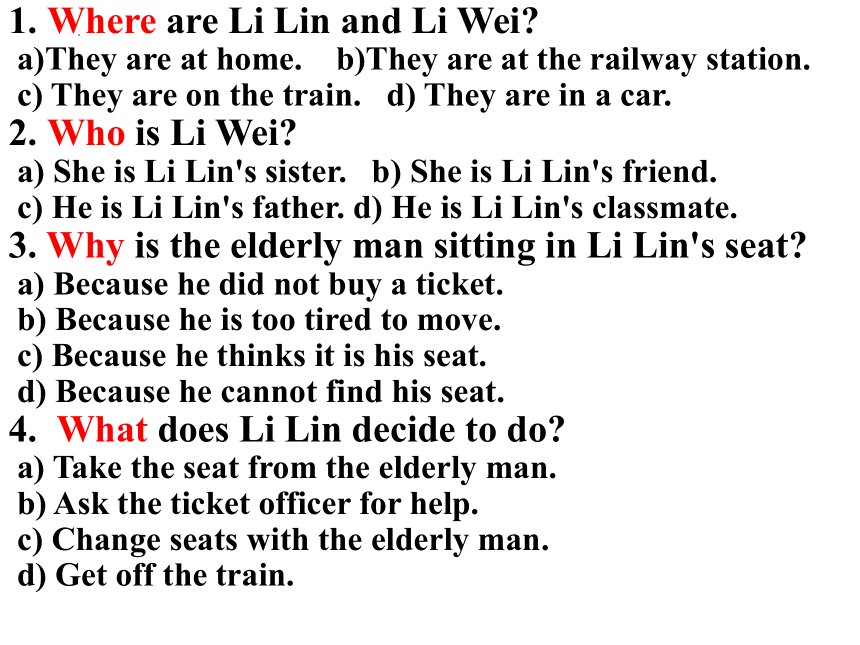
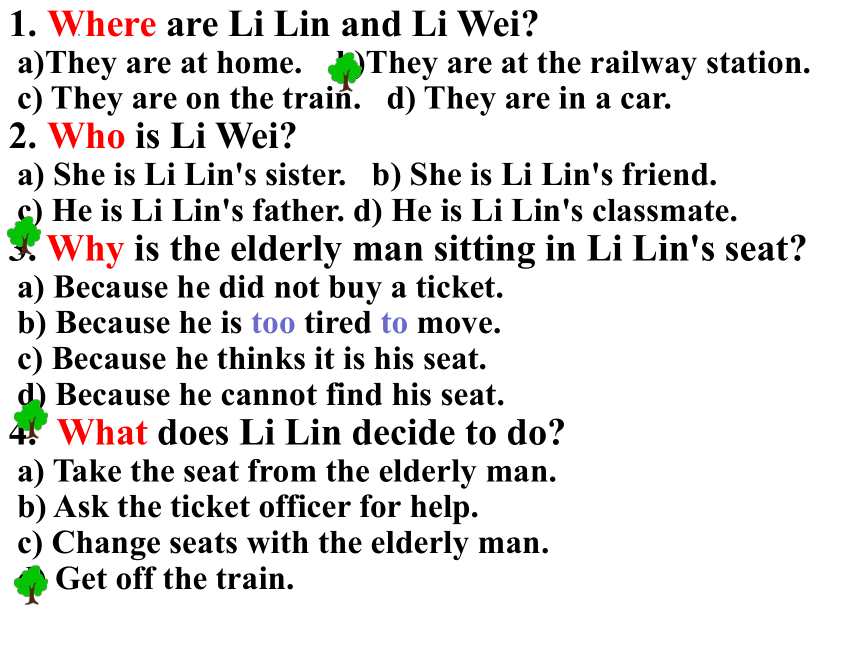
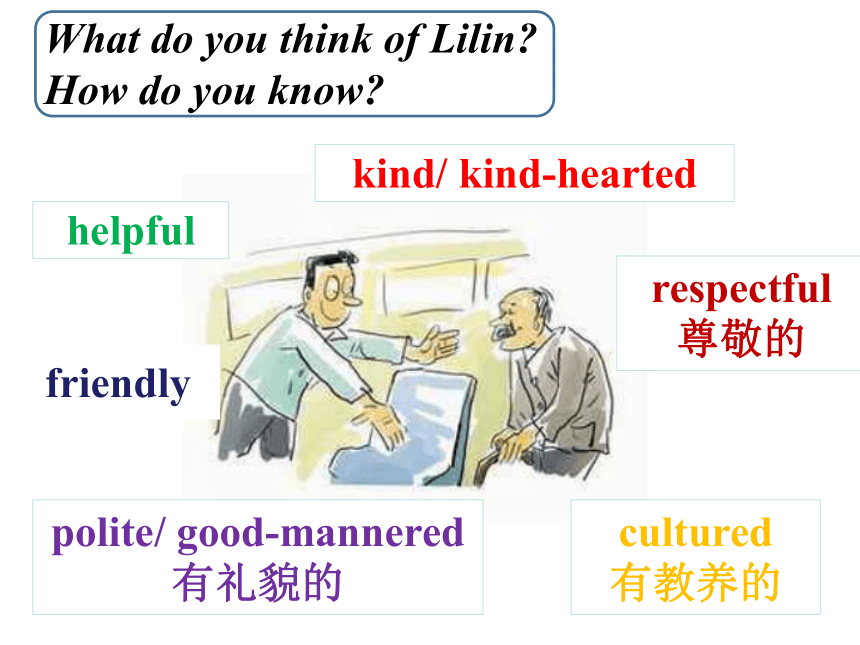
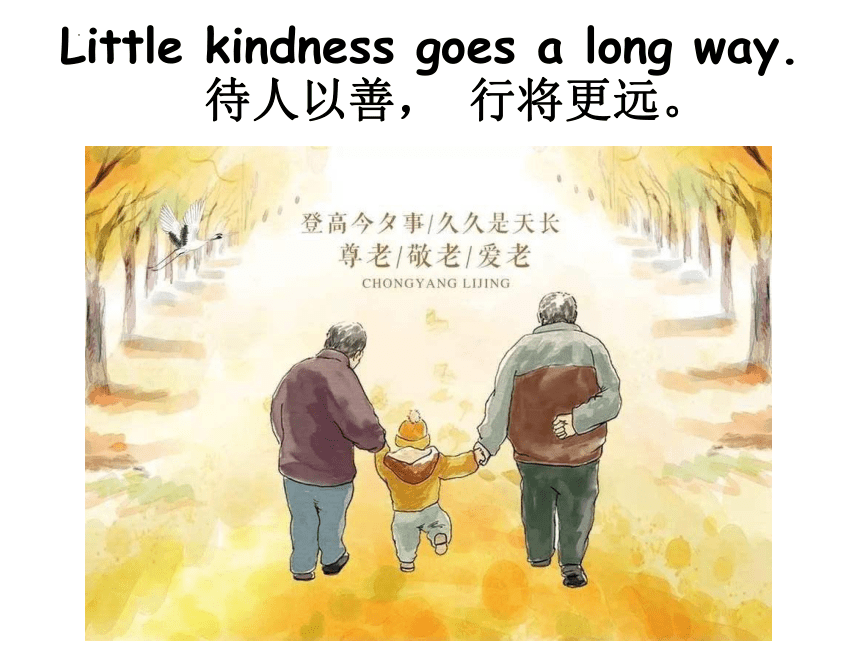
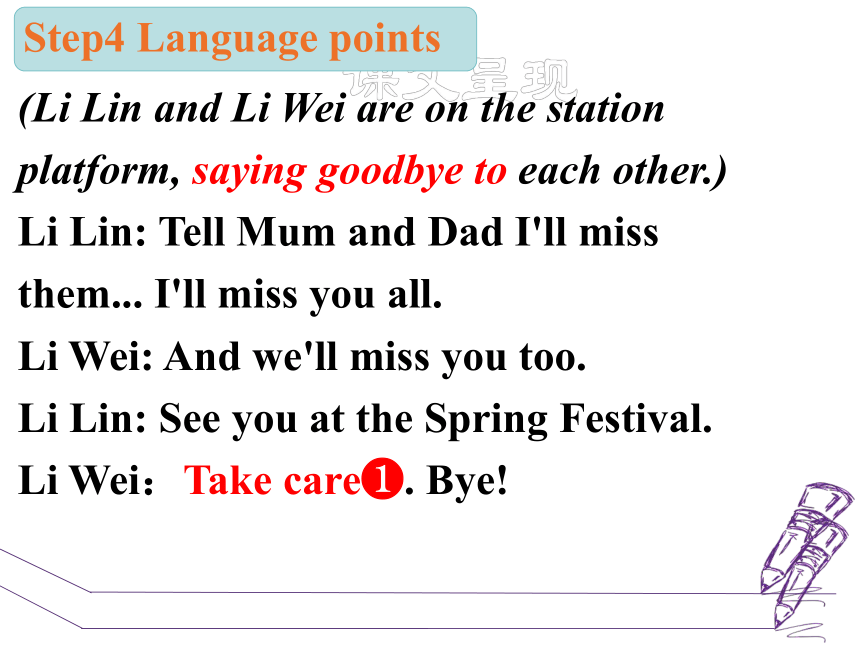
文档简介
(共36张PPT)
Unit 2
It’s a long story.
Module 1
Travel
Step1 Warming up
1. Do you like traveling
2. How do you travel Do you travel with a group or travel alone
Oral English 口语训练
Recently, we have discussed the ways to go
traveling. Here is the result.
Some students choose to travel with a group. With a guide’s help, they won’t get lost and they don’t need to look for hotels by themselves. Besides, they can make friends and help each other while traveling. However, other students prefer to travel alone. That’s because they can arrange their time freely and choose to visit their favourite sights. What’s more, it’s a chance for them to learn to look after themselves. For me, I’d like to travel alone. I want to spend enough time visiting the places I like. In this way, I can enjoy my vacation better.
Train T267
Car 18,
Seat 079a
Name & ID card
Step2 Words and expressions
station platform
ticket officer
1. express train 特别快车
2. fast train 快车
3. through train 直达快车
4. stopping train, slow train 慢车
5. sleeping car, sleeper 卧车
6. dining car, restaurant car, luncheon car 餐车
7. berth, bunk 铺位
8. upper berth 上铺
9. middle berth 中铺
10. lower berth 下铺
拓展词汇
Step3 While-reading
Lilin's story during a trip
1. Where are Li Lin and Li Wei
a)They are at home. b)They are at the railway station.
c) They are on the train. d) They are in a car.
2. Who is Li Wei
a) She is Li Lin's sister. b) She is Li Lin's friend.
c) He is Li Lin's father. d) He is Li Lin's classmate.
3. Why is the elderly man sitting in Li Lin's seat
a) Because he did not buy a ticket.
b) Because he is too tired to move.
c) Because he thinks it is his seat.
d) Because he cannot find his seat.
4. What does Li Lin decide to do
a) Take the seat from the elderly man.
b) Ask the ticket officer for help.
c) Change seats with the elderly man.
d) Get off the train.
1. Where are Li Lin and Li Wei
a)They are at home. b)They are at the railway station.
c) They are on the train. d) They are in a car.
2. Who is Li Wei
a) She is Li Lin's sister. b) She is Li Lin's friend.
c) He is Li Lin's father. d) He is Li Lin's classmate.
3. Why is the elderly man sitting in Li Lin's seat
a) Because he did not buy a ticket.
b) Because he is too tired to move.
c) Because he thinks it is his seat.
d) Because he cannot find his seat.
4. What does Li Lin decide to do
a) Take the seat from the elderly man.
b) Ask the ticket officer for help.
c) Change seats with the elderly man.
d) Get off the train.
What do you think of Lilin
How do you know
friendly
helpful
polite/ good-mannered
有礼貌的
kind/ kind-hearted
cultured
有教养的
respectful
尊敬的
Little kindness goes a long way.
待人以善, 行将更远。
(Li Lin and Li Wei are on the station platform, saying goodbye to each other.)
Li Lin: Tell Mum and Dad I'll miss them... I'll miss you all.
Li Wei: And we'll miss you too.
Li Lin: See you at the Spring Festival.
Li Wei:Take care . Bye!
Step4 Language points
知识点
1
take care (告别用语)多保重
take care还有“当心,小心”的意思。
可单独使用,也可以后跟动词不定式或that从句,相当于be careful。
eg: Take care! The bus is coming.
当心!公共汽车来了。
Take care not to go across the road alone.
注意不要自己过马路。
[图解助记]
各种“小心”
Look out!
Watch out!
Watch it!
Be careful!
都是“小心!”的意思。
[温馨提示]
take care of 意为“照顾”,
其同义词组为look after。
(Li Lin gets on the train and looks for his seat.)
Li Lin:Excuse me, sir. I'm afraid you're sitting
in my seat.
Elderly man: I'm sorry, young man. What did you
say I can't hear very well.
Li Lin: You've taken the wrong seat.
Elderly man: Really But...I thought it was my seat.
Where's my ticket
(The elderly man looks for his ticket in his pocket, his bag and finally in his wallet.)
Elderly man: Here it is. Car 9, Seat 12A.This is Seat
12A, isn't it
知识点
2
I'm afraid 恐怕
eg:I'm afraid you can't smoke here.
恐怕你不能在这儿抽烟。
辨析be afraid of...与be afraid to do sth.
考向一【易错点】
be afraid of... 害怕/担心…… 其后接名词、代词和动名词。
be afraid to do sth. 由于害怕而不敢做某事。 其中的to为不定式符号,后面的动词用原形。
魔法记忆
魔法记忆
考向二
be afraid +that从句
用所给词的适当形式填空。
Are you afraid of ________ (go) out alone at night
典例
going
意为“恐怕……”,常表示委婉语气,口语中that
可省略。
【点拨】此题用语法分析法。be afraid of 后跟动名词。
(The ticket officer arrives.)
Ticket officer:Tickets, please. Please have your tickets
ready.
Elderly man:Excuse me, is this Seat 12A
Ticket officer:Yes, it is. Let's have a look at your ticket.
Oh, I see the problem. This is Seat 12A,
but you should be in Car 9.This is Car 8.
Elderly man:Oh, how stupid of me! I'd better go and find Car 9.
(The elderly man gets up and starts to collect his bags.)
Li Lin: Wait a moment, sir! Please stay here. I'll take
your seat in Car 9.
Elderly man: Well, that's very good of you. Thank you.
Ticket officer: Yes, thank you, young man.
知识点
3
Oh, how stupid of me!哦,我是多么糊涂啊!
考向一
本句为how引导的感叹句。
eg:How tall the girl is!那位女孩多高啊!
感叹句的不同结构
用what引导 What+形容词+不可数名词/可数名词的复数形式+主语+谓语+其他!
What+a/an+形容词+可数名词的单数形式+主语+谓语+其他!
用how引导 How+形容词/副词+主语+谓语+其他!
完成句子
这部电影真乏味啊!我都快睡着了。
________ ________ ________ movie it was!
I almost fell asleep.
典例
What a boring
考向二
Our school is beautiful.(改为感叹句) (黔西南)
________ ________ our school is!
典例
How beautiful
把陈述句变为感叹句的方法:
一断二加三换。 “一断”即在谓语后面断开。
“二加”即在第二部分前加上what或how。
“三换”即把第一部分和第二部分互换位置,句号换成
感叹号,注意句中有关单词的首字母的大小写。
【点拨】此题用一断二加三换法解题。先在系动词is后断开,再加上how,然后两部分互换位置,Our改为our,how改为How,故答案为How beautiful。
(Li Lin goes past people standing in the train to Car 9.)
Li Lin: 10A...11A...12A, here it is. That's my seat.
(His friend, Wen Peng, is sitting in Seat 12B.He is surprised to see Li Lin.)
Wen Peng:Hi, Li Lin! What a surprise!
Li Lin: Hey, Wen Peng! It's great to see you.
Wen Peng: Great to see you too. Wonderful! I'll have
someone to talk to on the long journey. Now,
take off your jacket. Sit down and make
yourself comfortable. But why are you so late
Li Lin: Oh, it's a long story...,
知识点
4
take off 脱下
take off意为“脱下”时的反义短语为put on,take off还有“(飞机等)起飞”的意思。
eg:Our plane took off at 8: 00 yesterday.
我们的飞机是昨天八点起飞的。
考向一
eg:Don't take off your coat. It's very cold today. 别脱下大衣,今天天很冷。
魔法记忆
It's very hot. You'd better________your coat.
A.take off B.not take off
C.put on D.to put on
典例
A
【点拨】此题用语境法。由语境“这儿很热。”可推知空格
处应用“脱下”,且had better 后跟动词原形,故选A。
take off是“动词+副词”型短语。名词作其宾语时,可以放在off后面,也可以放在take和off中间;代词作其宾语时,必须放在take和off中间。
eg:Your shoes are dirty. Please take them off.
你的鞋子脏了。请把它们脱下来吧。
考向二
知识点
5
冠词
语法讲解
考点一: 定冠词(the)的用法
考点二: 不定冠词(a, an)的用法
考点三: 零冠词的用法
┃定冠词的用法 ┃
1. 表示特指,既可特指上文提到过的人或事物,也可特指谈话双方都清楚的人或事物。
Lily bought a storybook. The book is very interesting.
莉莉买了一本故事书。这本书很有趣。
2. 表示类别, 定冠词与单数可数名词连用表示一类事物,有时还可以与某些形容词连用表示一类人。
The tiger is in danger of becoming extinct.
老虎有绝种的危险。
We should try our best to help the disabled.
我们应该尽力帮助残疾人。
3. 表示世上独一无二的事物。
the sun, the moon, the earth, the sky, the world
4. 与序数词和形容词最高级连用。
the first day, the most popular teacher
5. 专有名词前。用于某些专有名词前,如河流、海洋、山川、岛屿、海峡、沙漠等专有名词前,以及用于由普通名词构成的专有名词如国名、地名、团体、机构等前。
the Yellow River 黄河
6. 通常用于西洋乐器名称前(中国民族乐器前不用)。
play the guitar 弹吉他
7.用于姓氏的复数形式之前,表示一家人或夫妇二人。
The Whites are having dinner. 怀特一家正在吃晚饭。
8.用于逢整十数词的复数前,指世纪的某个年代。
in the 1980s 在20世纪80年代
9.用在方位名词前。
in the east of China 在中国的东部
10.用在某些习惯用语中。
at the same time 同时, on the other hand 另一方面
┃不定冠词的用法 ┃
1.泛指某一类人或物中的任何一个。
She works in a famous hospital.
她在一家著名的医院工作。
2.笼统指某类中的某一个,但又不具体说明是哪一个。
He bought a robot yesterday.
他昨天买了个机器人。
3.表示某人的身份、职业、国籍等。
He is a Frenchman. 他是一个法国人。
4.表示数量“一”,但数的概念不如one强烈。I have a lovely sister.
我有一个可爱的妹妹。
5.a 用于辅音音素前;an 用于元音音素前。
a dog, an island, a useful book, an honest man
6.用于序数词之前,表示数量或序数的增加。
I want to read it a second time.
我想再读一次。
7.用于表示非常,很等意义的 most 前。
This is a most interesting story.
这是一个非常有趣的故事。
8.构成短语表示数量。
a few apples, a little money
┃零冠词的场合 ┃
1.专有名词(包括人名、地名、节日、月份、季节)前不用冠词。
China, Children's Day
2.物质名词和抽象名词前一般不加冠词。 time, life, fruit
3.表示一类人或事物的复数名词前不用冠词。 They are teachers. 他们是教师。
4.人名、称呼语、头衔、职务等名词前一般不加冠词。
Mr Wang, Alice
5.三餐、球类、棋类、游戏名称前不用冠词。have dinner, play chess
6.在与by 连用的交通工具名称前不用冠词。
by train 乘火车
7.名词前有物主代词、指示代词、不定代词或名词所有格修饰时,不用冠词。
That is Mary's book. 那是玛丽的书。
8.某些固定短语中不用冠词。如:
knife and fork 刀叉, in fact 事实上,in bed 躺在床上
1. 本节课我们学习了戏剧“发生在火车上的事”。
2. 我们学习了单词platform, ticket officer, jacket, elderly,及火车相关的10个拓展词汇。
3. 我们学习了知识点take care; I’m afraid; Oh, how stupid of me; take off的用法。复习了语法
冠词(定冠词the,不定冠词a/an, 零冠词)
4. Little kindness goes a long way.
待人以善, 行将更远。
Step5 Summary
请大声朗读并背诵以下文章。
Step6 Homework
Recently, we have discussed the ways to go
traveling. Here is the result.
Some students choose to travel with a group. With a guide’s help, they won’t get lost and they don’t need to look for hotels by themselves. Besides, they can make friends and help each other while traveling. However, other students prefer to travel alone. That’s because they can arrange their time freely and choose to visit their favourite sights. What’s more, it’s a chance for them to learn to look after themselves. For me, I’d like to travel alone. I want to spend enough time visiting the places I like. In this way, I can enjoy my vacation better.
Unit 2
It’s a long story.
Module 1
Travel
Step1 Warming up
1. Do you like traveling
2. How do you travel Do you travel with a group or travel alone
Oral English 口语训练
Recently, we have discussed the ways to go
traveling. Here is the result.
Some students choose to travel with a group. With a guide’s help, they won’t get lost and they don’t need to look for hotels by themselves. Besides, they can make friends and help each other while traveling. However, other students prefer to travel alone. That’s because they can arrange their time freely and choose to visit their favourite sights. What’s more, it’s a chance for them to learn to look after themselves. For me, I’d like to travel alone. I want to spend enough time visiting the places I like. In this way, I can enjoy my vacation better.
Train T267
Car 18,
Seat 079a
Name & ID card
Step2 Words and expressions
station platform
ticket officer
1. express train 特别快车
2. fast train 快车
3. through train 直达快车
4. stopping train, slow train 慢车
5. sleeping car, sleeper 卧车
6. dining car, restaurant car, luncheon car 餐车
7. berth, bunk 铺位
8. upper berth 上铺
9. middle berth 中铺
10. lower berth 下铺
拓展词汇
Step3 While-reading
Lilin's story during a trip
1. Where are Li Lin and Li Wei
a)They are at home. b)They are at the railway station.
c) They are on the train. d) They are in a car.
2. Who is Li Wei
a) She is Li Lin's sister. b) She is Li Lin's friend.
c) He is Li Lin's father. d) He is Li Lin's classmate.
3. Why is the elderly man sitting in Li Lin's seat
a) Because he did not buy a ticket.
b) Because he is too tired to move.
c) Because he thinks it is his seat.
d) Because he cannot find his seat.
4. What does Li Lin decide to do
a) Take the seat from the elderly man.
b) Ask the ticket officer for help.
c) Change seats with the elderly man.
d) Get off the train.
1. Where are Li Lin and Li Wei
a)They are at home. b)They are at the railway station.
c) They are on the train. d) They are in a car.
2. Who is Li Wei
a) She is Li Lin's sister. b) She is Li Lin's friend.
c) He is Li Lin's father. d) He is Li Lin's classmate.
3. Why is the elderly man sitting in Li Lin's seat
a) Because he did not buy a ticket.
b) Because he is too tired to move.
c) Because he thinks it is his seat.
d) Because he cannot find his seat.
4. What does Li Lin decide to do
a) Take the seat from the elderly man.
b) Ask the ticket officer for help.
c) Change seats with the elderly man.
d) Get off the train.
What do you think of Lilin
How do you know
friendly
helpful
polite/ good-mannered
有礼貌的
kind/ kind-hearted
cultured
有教养的
respectful
尊敬的
Little kindness goes a long way.
待人以善, 行将更远。
(Li Lin and Li Wei are on the station platform, saying goodbye to each other.)
Li Lin: Tell Mum and Dad I'll miss them... I'll miss you all.
Li Wei: And we'll miss you too.
Li Lin: See you at the Spring Festival.
Li Wei:Take care . Bye!
Step4 Language points
知识点
1
take care (告别用语)多保重
take care还有“当心,小心”的意思。
可单独使用,也可以后跟动词不定式或that从句,相当于be careful。
eg: Take care! The bus is coming.
当心!公共汽车来了。
Take care not to go across the road alone.
注意不要自己过马路。
[图解助记]
各种“小心”
Look out!
Watch out!
Watch it!
Be careful!
都是“小心!”的意思。
[温馨提示]
take care of 意为“照顾”,
其同义词组为look after。
(Li Lin gets on the train and looks for his seat.)
Li Lin:Excuse me, sir. I'm afraid you're sitting
in my seat.
Elderly man: I'm sorry, young man. What did you
say I can't hear very well.
Li Lin: You've taken the wrong seat.
Elderly man: Really But...I thought it was my seat.
Where's my ticket
(The elderly man looks for his ticket in his pocket, his bag and finally in his wallet.)
Elderly man: Here it is. Car 9, Seat 12A.This is Seat
12A, isn't it
知识点
2
I'm afraid 恐怕
eg:I'm afraid you can't smoke here.
恐怕你不能在这儿抽烟。
辨析be afraid of...与be afraid to do sth.
考向一【易错点】
be afraid of... 害怕/担心…… 其后接名词、代词和动名词。
be afraid to do sth. 由于害怕而不敢做某事。 其中的to为不定式符号,后面的动词用原形。
魔法记忆
魔法记忆
考向二
be afraid +that从句
用所给词的适当形式填空。
Are you afraid of ________ (go) out alone at night
典例
going
意为“恐怕……”,常表示委婉语气,口语中that
可省略。
【点拨】此题用语法分析法。be afraid of 后跟动名词。
(The ticket officer arrives.)
Ticket officer:Tickets, please. Please have your tickets
ready.
Elderly man:Excuse me, is this Seat 12A
Ticket officer:Yes, it is. Let's have a look at your ticket.
Oh, I see the problem. This is Seat 12A,
but you should be in Car 9.This is Car 8.
Elderly man:Oh, how stupid of me! I'd better go and find Car 9.
(The elderly man gets up and starts to collect his bags.)
Li Lin: Wait a moment, sir! Please stay here. I'll take
your seat in Car 9.
Elderly man: Well, that's very good of you. Thank you.
Ticket officer: Yes, thank you, young man.
知识点
3
Oh, how stupid of me!哦,我是多么糊涂啊!
考向一
本句为how引导的感叹句。
eg:How tall the girl is!那位女孩多高啊!
感叹句的不同结构
用what引导 What+形容词+不可数名词/可数名词的复数形式+主语+谓语+其他!
What+a/an+形容词+可数名词的单数形式+主语+谓语+其他!
用how引导 How+形容词/副词+主语+谓语+其他!
完成句子
这部电影真乏味啊!我都快睡着了。
________ ________ ________ movie it was!
I almost fell asleep.
典例
What a boring
考向二
Our school is beautiful.(改为感叹句) (黔西南)
________ ________ our school is!
典例
How beautiful
把陈述句变为感叹句的方法:
一断二加三换。 “一断”即在谓语后面断开。
“二加”即在第二部分前加上what或how。
“三换”即把第一部分和第二部分互换位置,句号换成
感叹号,注意句中有关单词的首字母的大小写。
【点拨】此题用一断二加三换法解题。先在系动词is后断开,再加上how,然后两部分互换位置,Our改为our,how改为How,故答案为How beautiful。
(Li Lin goes past people standing in the train to Car 9.)
Li Lin: 10A...11A...12A, here it is. That's my seat.
(His friend, Wen Peng, is sitting in Seat 12B.He is surprised to see Li Lin.)
Wen Peng:Hi, Li Lin! What a surprise!
Li Lin: Hey, Wen Peng! It's great to see you.
Wen Peng: Great to see you too. Wonderful! I'll have
someone to talk to on the long journey. Now,
take off your jacket. Sit down and make
yourself comfortable. But why are you so late
Li Lin: Oh, it's a long story...,
知识点
4
take off 脱下
take off意为“脱下”时的反义短语为put on,take off还有“(飞机等)起飞”的意思。
eg:Our plane took off at 8: 00 yesterday.
我们的飞机是昨天八点起飞的。
考向一
eg:Don't take off your coat. It's very cold today. 别脱下大衣,今天天很冷。
魔法记忆
It's very hot. You'd better________your coat.
A.take off B.not take off
C.put on D.to put on
典例
A
【点拨】此题用语境法。由语境“这儿很热。”可推知空格
处应用“脱下”,且had better 后跟动词原形,故选A。
take off是“动词+副词”型短语。名词作其宾语时,可以放在off后面,也可以放在take和off中间;代词作其宾语时,必须放在take和off中间。
eg:Your shoes are dirty. Please take them off.
你的鞋子脏了。请把它们脱下来吧。
考向二
知识点
5
冠词
语法讲解
考点一: 定冠词(the)的用法
考点二: 不定冠词(a, an)的用法
考点三: 零冠词的用法
┃定冠词的用法 ┃
1. 表示特指,既可特指上文提到过的人或事物,也可特指谈话双方都清楚的人或事物。
Lily bought a storybook. The book is very interesting.
莉莉买了一本故事书。这本书很有趣。
2. 表示类别, 定冠词与单数可数名词连用表示一类事物,有时还可以与某些形容词连用表示一类人。
The tiger is in danger of becoming extinct.
老虎有绝种的危险。
We should try our best to help the disabled.
我们应该尽力帮助残疾人。
3. 表示世上独一无二的事物。
the sun, the moon, the earth, the sky, the world
4. 与序数词和形容词最高级连用。
the first day, the most popular teacher
5. 专有名词前。用于某些专有名词前,如河流、海洋、山川、岛屿、海峡、沙漠等专有名词前,以及用于由普通名词构成的专有名词如国名、地名、团体、机构等前。
the Yellow River 黄河
6. 通常用于西洋乐器名称前(中国民族乐器前不用)。
play the guitar 弹吉他
7.用于姓氏的复数形式之前,表示一家人或夫妇二人。
The Whites are having dinner. 怀特一家正在吃晚饭。
8.用于逢整十数词的复数前,指世纪的某个年代。
in the 1980s 在20世纪80年代
9.用在方位名词前。
in the east of China 在中国的东部
10.用在某些习惯用语中。
at the same time 同时, on the other hand 另一方面
┃不定冠词的用法 ┃
1.泛指某一类人或物中的任何一个。
She works in a famous hospital.
她在一家著名的医院工作。
2.笼统指某类中的某一个,但又不具体说明是哪一个。
He bought a robot yesterday.
他昨天买了个机器人。
3.表示某人的身份、职业、国籍等。
He is a Frenchman. 他是一个法国人。
4.表示数量“一”,但数的概念不如one强烈。I have a lovely sister.
我有一个可爱的妹妹。
5.a 用于辅音音素前;an 用于元音音素前。
a dog, an island, a useful book, an honest man
6.用于序数词之前,表示数量或序数的增加。
I want to read it a second time.
我想再读一次。
7.用于表示非常,很等意义的 most 前。
This is a most interesting story.
这是一个非常有趣的故事。
8.构成短语表示数量。
a few apples, a little money
┃零冠词的场合 ┃
1.专有名词(包括人名、地名、节日、月份、季节)前不用冠词。
China, Children's Day
2.物质名词和抽象名词前一般不加冠词。 time, life, fruit
3.表示一类人或事物的复数名词前不用冠词。 They are teachers. 他们是教师。
4.人名、称呼语、头衔、职务等名词前一般不加冠词。
Mr Wang, Alice
5.三餐、球类、棋类、游戏名称前不用冠词。have dinner, play chess
6.在与by 连用的交通工具名称前不用冠词。
by train 乘火车
7.名词前有物主代词、指示代词、不定代词或名词所有格修饰时,不用冠词。
That is Mary's book. 那是玛丽的书。
8.某些固定短语中不用冠词。如:
knife and fork 刀叉, in fact 事实上,in bed 躺在床上
1. 本节课我们学习了戏剧“发生在火车上的事”。
2. 我们学习了单词platform, ticket officer, jacket, elderly,及火车相关的10个拓展词汇。
3. 我们学习了知识点take care; I’m afraid; Oh, how stupid of me; take off的用法。复习了语法
冠词(定冠词the,不定冠词a/an, 零冠词)
4. Little kindness goes a long way.
待人以善, 行将更远。
Step5 Summary
请大声朗读并背诵以下文章。
Step6 Homework
Recently, we have discussed the ways to go
traveling. Here is the result.
Some students choose to travel with a group. With a guide’s help, they won’t get lost and they don’t need to look for hotels by themselves. Besides, they can make friends and help each other while traveling. However, other students prefer to travel alone. That’s because they can arrange their time freely and choose to visit their favourite sights. What’s more, it’s a chance for them to learn to look after themselves. For me, I’d like to travel alone. I want to spend enough time visiting the places I like. In this way, I can enjoy my vacation better.
同课章节目录
- Module 1 Travel
- Unit 1 We toured the city by bus and by taxi
- Unit 2 It's a long story.
- Unit 3 Language in use
- Module 2 Education
- Unit 1 They don't sit in rows.
- Unit 2 What do I like best about school?
- Unit 3 Language in use
- Module 3 Life now and then
- Unit 1 They sometimes work harder.
- Unit 2 I think life is better today.
- Unit 3 Language in use.
- Module 4 Rules and suggestions
- Unit 1 You must be careful of falling stones.
- Unit 2 we must keep the camp clean.
- Unit 3 Language in use.
- Revison A
- Module 5 Look after yourself
- Unit 1 We'd better get you to hospital.
- Unit 2 Get off the sofa!
- Unit 3 Language in use.
- Module 6 Eating togethe
- Unit 1 When is the school-leavers' party?
- Unit 2 Knives and forks are used for most Western
- Unit 3 Language in use
- Module 7 English for you and me
- Unit 1 Have you ever been to an English corner?
- Unit 2 We all own English.
- Unit 3 Language in use
- Module 8 My future life
- Unit 1 Here's to our friendship and the future
- Unit 2 I know that you will be better at maths.
- Unit 3 Language in use
- Revison B
